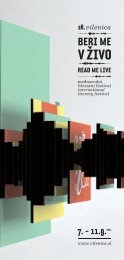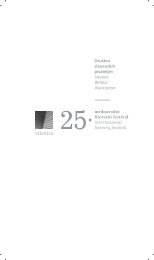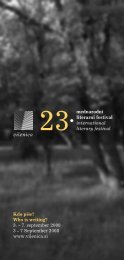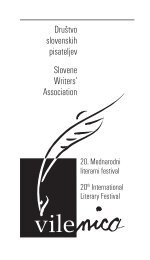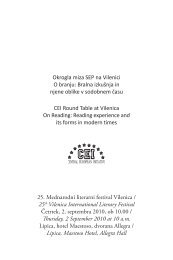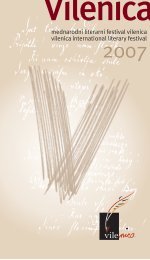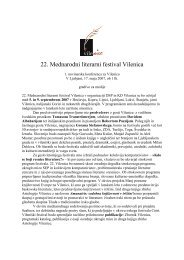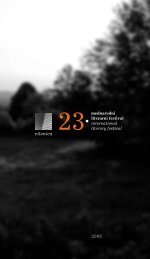Publikacija SEP 2011 - Vilenica
Publikacija SEP 2011 - Vilenica
Publikacija SEP 2011 - Vilenica
You also want an ePaper? Increase the reach of your titles
YUMPU automatically turns print PDFs into web optimized ePapers that Google loves.
undefined, like the idealized world of chivalry that the honest knight<br />
seeks on his quest. I read Don Quixote in the South Pacific, trying to<br />
raise a family on an impossibly small budget, feeling a little mad in the<br />
alien Polynesian culture, like the poor knight among the aristocrats. I<br />
read Don Quixote in Canada, where the country’s multicultural society<br />
seemed to me appealingly quixotic in tone and style. To these readings,<br />
and many others, I can now add a medicinal Don Quixote, both<br />
as a balm and a consolation.<br />
None of these Don Quixotes can be found, of course, in any library,<br />
except in the one kept by my diminishing memory. Karel Capek, in<br />
his wonderful book on gardens, says that the art of gardening can<br />
be reduced to one rule: you put into it more than you take out. The<br />
same can be said of the art of libraries. But the libraries of the material<br />
world, however great their hunger, can only hoard existing volumes.<br />
We know that every book holds within it all its possible readings, past,<br />
present and future, but its Pythagorean reincarnations, those wonderful<br />
forms which depend on readers to come, will not be found on our<br />
shelves. Paul Masson, a friend of Colette who worked at the Bibliothèque<br />
Nationale in Paris, noticed that the vast stocks of the library<br />
were defective in Latin and Italian books of the fifteenth century, and<br />
so began adding invented titles on the official index cards to save, he<br />
said, “the catalogue’s prestige.” When Colette naïvely asked him what<br />
was the use of books that didn’t exist, Masson responded nonchalantly<br />
that he couldn’t be expected “to do everything!” But librarians must,<br />
and wishful thinking cannot, unfortunately, be granted room in a seriously<br />
run institution.<br />
In the library of the mind, however, books that have no material<br />
existence constantly cram the shelves: books that are the amalgamation<br />
of other books once read and now only imperfectly remembered,<br />
books that annotate, gloss and comment others too rich to stand on<br />
their own, books written in dreams or in nightmares and that now preserve<br />
the tone of those nebulous realms, books that we know should<br />
exist but which have never been written, autobiographical books of<br />
unspeakable experiences, books of unutterable desires, books of once<br />
72




